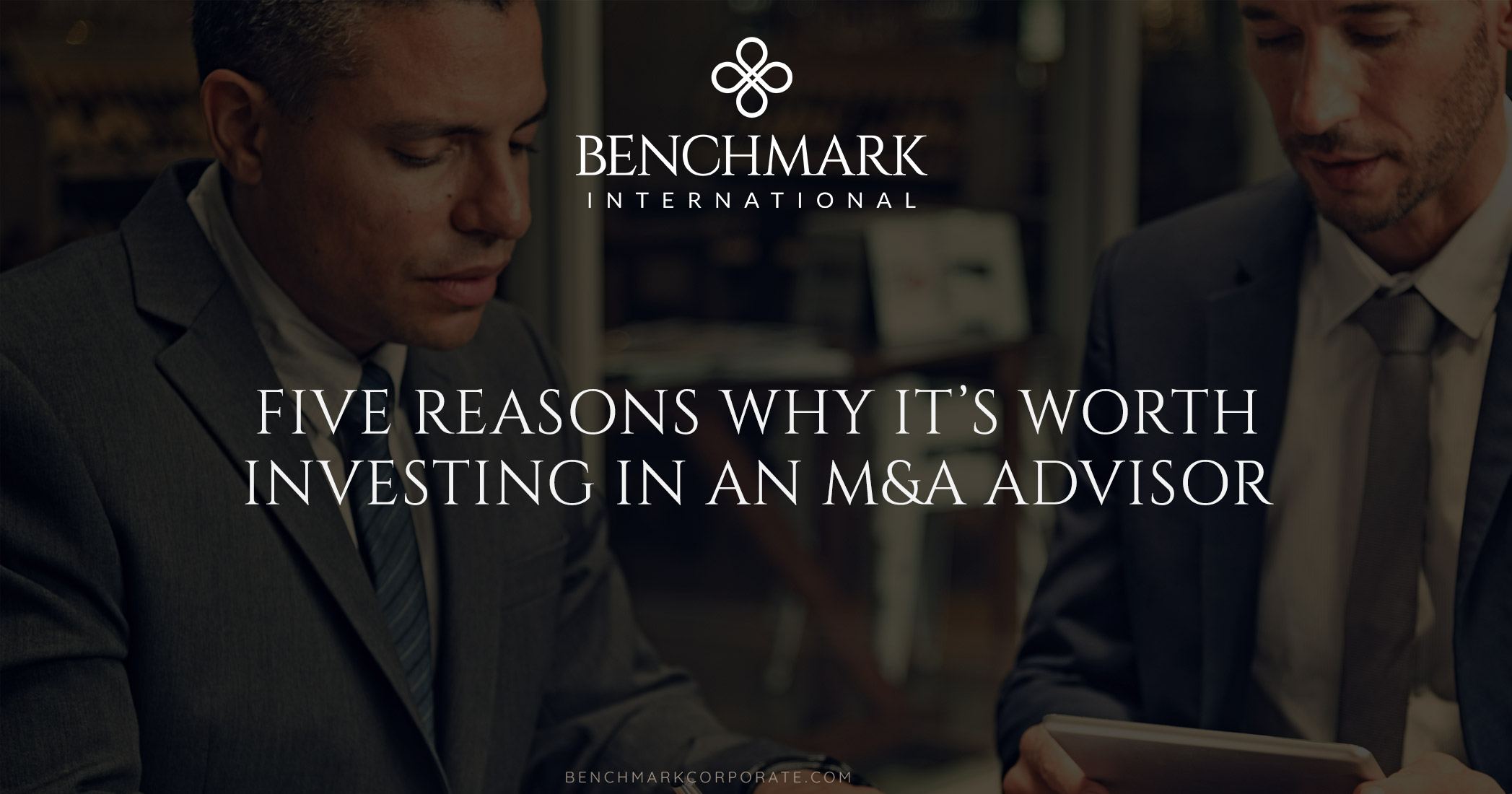Archives
Congratulations to Our AFSIC Competition Winner: Get Ready for AFSIC 2023!
What Is A 338(H)(10) Election And Why It Is Important To Me?
Knowing the structure of a transaction you are involved in is key to optimizing the composition of a deal. If you enter a proposed transaction thinking you understand the offer, you may be blindsided by various structures that may affect your net cash position. A critical aspect of a transaction is understanding the structure and what it means for you as a buyer or seller. Clients often believe that they agree to accept a stock transaction only to find out that the transaction will include an election that may affect their tax bill. A 338(H)(10) election is one of the more popular tax elections, but there are others.
READ MORE >>Share this:
How Can A Buyer Claw Back Purchase Price?
Sellers often focus on the purchase price when considering a sale. Most sellers aim to maximize the proceeds realized through the sale of their business. This mindset makes total sense. They are monetizing their life’s work. Many have lived frugally, diverting money into rather than out of business. As such, the sale of the company truly is the time to monetize a lifetime of effort.
Buyers who have been stretched to a valuation beyond their comfort level may be motivated to recapture some of that “excess purchase price” during the deal. Their approach to minimizing their outlay can take on several forms. In this article, I will cover a few of the most common methods used by buyers to “normalize” their outlay.
READ MORE >>Share this:
I missed the market!
We have been in an unprecedented bull market. I use the phrase here broadly as the public markets have been flying for over a decade, and the M&A market has seen similar levels of growth. Spurred on by aggressive monetary and fiscal policies and a relaxed regulatory environment, the S&P 500 has grown 15.47% as of the time of this writing from the bottom on March 9, 2009. Similarly, the DJIA (The Dow 30) has grown at an annual clip of 13.64% over the course of this thirteen-year bull market. Remember what the rule of 72 demonstrates- that money doubles every 6 years at 12% and in less than five years at 15%. This is a remarkable rate of growth when you consider this market has spanned nearly 1/7th of a century.
But bull markets must end. Markets do work in cycles. Much like our natural habitats require destructive fires to seed future growth and a healthy ecosystem, so too does the market. I’m not referencing the concrete jungles we find ourselves in today, but rather our natural environments. Bear markets reintroduce a rational approach to investing that had long been sidelined in favor of momentum and emotion-based investment “theses."
Further, bear markets tend to focus investments toward the highest quality of companies, known as a flight to quality. This clearing of the playing field, separating the wheat from the chaff, will often spur innovation and future growth. So a bear market is as natural to the market dynamic as is a bull market. These countervailing forces are required for regeneration.
The bull market created trillions of dollars of dry powder for buyers to deploy in the coming years. The balance sheets of corporations, large and small, are replete with cash there to deploy in pursuit of their stated strategic goals. The best of markets tends to flood the M&A market with excess buyers, many of which lack the track record, experience, credibility, and true access to funding required to transact successfully. Bear markets tend to weed away many of these less credible buyers creating a similar flight to quality detailed in the above discussion about the public markets. And while the cost of debt will tick up and valuations may similarly tick down, the likelihood of actually consummating a transaction increase as there is a much better chance that the buyer selected can get a deal done.
I tend to view my decisions in life through a very specific lens- my expected value lens. If one were to look at an M&A transaction through that lens, we would likely find the expected value of the proceeds from a transaction as being higher, even if valuations tick down, because the likelihood of closing is greatly increased. And frankly, while the cost of capital on senior debt will rise over the course of the year, given the aforementioned stores of cash in their coffers, buyers will have the ability to utilize more equity to bridge any gaps in the capital stack. Private Equity funds have more than $2 Trillion of dry power. They also have a mandate to put capital to work regardless of the cost of debt lest they face aggressive headwinds during their next fund raise. Their Limited Partners, known as LPs, require that they put the money to work. Deals will continue to happen and we may in fact see more deals in the next eighteen months or more as buyers finally draw down on the excess stores of cash build-up that resulted from inflated valuations and bidding wars with less credible buyers.
Sellers must consider several factors when considering a sale. Of course, valuation and a healthy economic environment are among those factors but they don't have to be the determining one. We are often faced with life changes of which we have no control. Some of us simply reach a stage where we no longer wish to carry the burden that invariably comes with owning and running a business. Or, God forbid, we encounter health challenges personally or in our family that requires that we focus our attention elsewhere. Perhaps we come to the realization that we are no longer the right caretaker for the business? That the business has reached a level where our skills no longer map to what is required to successfully steer. Whatever the reason to sell your company, we can only control the controllables.
Just like in the public markets, if we try to time it perfectly, we will invariably fail because the objective was unattainable. Selling one's business is a life-altering decision. Selling a business can be both liberating and gutting. Sellers are at once monetizing their life's work and entrusting someone else with its care. The stakes are high. When making that determination, it is critical that sellers consider all of the critical variables. While valuation, market conditions and timing are among the variables worthy of consideration, they are merely inputs to a multivariate equation. Often, upon careful consideration, sellers determine that the qualitative elements are more important than are the quantitative ones.
Author
Dara Shareef
Managing Partner
Benchmark International
T: 813 898 2350
E: Shareef@benchmarkintl.com
READ MORE >>
Share this:
Deal Fatigue: Preventative Measures
Deal fatigue is a condition that can arise during negotiations where involved parties begin to feel exhausted, discouraged, and frustrated in their attempt to reach an agreement. The negotiation process can sometimes be lengthy and demanding and requires players to spend valuable resources such as time, money, and energy. The inability to compromise in such negotiations not only depletes these resources but also can ultimately lead to a potential deal falling apart. Deal fatigue is a common obstacle in the world of mergers and acquisitions, one that both buyers and sellers alike have faced. From this, however, dealmakers around the globe have observed a few preventive measures that can be taken to ensure a successful transaction.
READ MORE >>Share this:
6 Indicators that it Might be Time to Sell Your Business
You may not have considered selling your business and moving onto the next project, as perhaps it is growing at an acceptable pace and you have no pressing reasons to sell. Nevertheless, it may be worth considering an exit if you can identify with any of the following:
Your Business is Making you Exhausted
There are a number of reasons why your business could be making you exhausted. Perhaps you only started it for the money and you don’t love what you do, or the lifestyle of an entrepreneur hasn’t met your expectations. Whichever way, you feel apathetic towards the business and dealing with it is tiring.
While you have no need to sell, if you feel burnt out by your business it is worth considering doing so – you are doing the business no favours by sticking it out as the business could suffer as a result of not having someone at the helm who wants to drive the business forward.
Business Growth
If your business is steadily growing, then it may be a good time to consider an exit. A buyer is likely to pay over the odds for your company if it is on a growth curve as they can reap the rewards later down the line.
Equally as attractive to a buyer is a business operating within a growth industry. Even if your business is not seeing the growth, if the industry you operate in is thriving, a buyer could be interested due to the opportunities available.
You’ve Received an Offer You Can’t Refuse
A buyer has approached you and offered to buy your business for a handsome sum of money. You weren’t thinking of selling but, as you might not receive an offer like this again, this is perhaps a good indicator that you should sell.
Nevertheless, it’s always beneficial to take your business to market even in the event of such an offer, because if one party is willing to offer this for your company, then there’s no reason why others wouldn’t value your business the same, or maybe even higher.
You Want to Take Advantage of Low Capital Gain Tax
Capital gains tax is at historically low levels; therefore, it is a good time to sell. While this is not the only reason you should sell, if you feel yourself identifying with other reasons on this list, then now may be a good time to take advantage of this.
You’ve Been Offered a Better Job Opportunity
This might seem strange – you are your own boss and now you are going to be an employee. However, there are many merits to being an employee – for example, a regular, and probably better, income and being free from the demands and liabilities involved in running your own business.
You Don’t Have the Correct Skills to Grow the Business
As a business grows, more and different skills are required to keep the business growing than when you initially started. For example, you might be a great salesperson, which was extremely beneficial when setting up the company but, now, leadership is required in different areas. You could possibly learn these skills, or employ more people to take on these new leadership roles, but if you feel like you don’t have the energy to carry on with the business, this may be another indicator that it’s time to move on.
While the above points may be a good indication that it’s time to move on, it’s unlikely that one of these alone will compel you to sell. Instead, you might decide to sell because of a mix of these reasons, coupled with other factors such as economic conditions. When this time does come, Benchmark International can help by discussing your exit strategy and assisting you in finding the best buyer for your needs.
READ MORE >>Share this:
Five Reasons Why It’s Worth Investing in an M&A Adviser When Selling Your Business
You have come to a point in your business life where you have decided that it is time to sell and move onto the next project. Of course, you want to command the best price for your business and explore all the opportunities available. As such, you have considered an M&A adviser to help in the process – but is it really worth it? They could help you generate more value for your business but if you factor in the fee for engaging their services, will you make any more money?
Then again, there are many advantages to hiring an M&A adviser, which are not just limited to value. If you have thought about hiring an M&A adviser, but are unsure of the benefits, consider the below:
They can Minimise Distractions During the Process
You know your business the best and if you are knowledgeable about the M&A process you could facilitate the transaction yourself – although this doesn’t mean you should. After all, an M&A transaction takes a significant amount of time and the time you have to spend on the transaction could end up being detrimental to business performance. As the value of a business is more often than not linked to financial performance, you need to focus your efforts into making sure the company is performing the best it can be, rather than focusing on the transaction itself.
They can Source a Larger Pool of Buyers
If you’re thinking of selling your business you may have an idea of the acquirers you want to approach. This is good, but an M&A adviser constantly networks with various strategic and financial buyers on a national and international basis in various industries; therefore, they have a very large pool of acquirers at their fingertips to contact about the opportunity. Not only is an M&A adviser’s pool of acquirers large, it is also varied, which means they can think outside the box and a lucrative deal could be sourced cross-sector. Another benefit of generating interest from a large pool of acquirers is you are more likely to have multiple competing bids, strengthening your negotiating stance.
They can Negotiate a Favourable Deal
As mentioned, an M&A adviser can help to create a competitive bidding environment which can lead to a better deal being negotiated; however, this is not the only way an M&A adviser negotiates on your behalf. Often, deals are not for 100% cash so an M&A adviser will negotiate a deal structure so both parties can reach a compromise and agreement. This can be very beneficial for you if, for example, you have just secured a large contract where earnings will increase over the next year, as, if the deal has been based on a multiple of current earnings, then you will not be correctly compensated for the contract you have secured. Therefore, an M&A adviser will negotiate a deal which will maximise value beyond the purchase price.
They can Protect your Interests
It is in your best interest to keep the sale of your company confidential – if it gets out that you are selling this could potentially alienate employees and customers and give your competition the upper hand. By yourself, when approaching potential acquirers, it is difficult to protect the identity of the company as it’s not easy to solicit interest without disclosing who you are. An M&A adviser, on the other hand, will have interested parties sign a non-disclosure agreement before they are given any information about the business, including the name of the business and the owner. At this stage, it is also important to gauge whether the company you are approaching has the finances to purchase your company – again, this is something which is difficult to do without compromising confidentiality.
They Add Valuable Resource
They say ‘first impressions are the most lasting’ so when it comes to selling your business, it is important that a potential acquirer’s first impression is first rate. An M&A adviser can assist with this through their proven processes that help businesses to market themselves as the complete package. As well, engaging an M&A adviser can add credibility to potential buyers as they can see that you are serious about conducting a transaction, which can save time and improve offers.
READ MORE >>
Share this:
Is an ESOP right for your company?
As a business owner you may be asking yourself how to keep your employees motivated and focused on the long-term objectives you have put in place for your business or you may be asking yourself how to raise additional capital to grow your business. There is a way to keep employees focused and aligned with the company’s growth objectives. Growing up in a family of entrepreneurs, I was always told that you better care of the things you actually own. Ever been to a nice hotel room and left the beds undone? The point here is that if employees take ownership of the business, they will have the business’ best interests at heart. One of the mechanisms used by many business owners as an exit strategy is an ESOP. An ESOP allows the continuity of an existing business and can be a great way for growth and expansion.
Employee Stock Ownership Plan, or better known as an ESOP, is an employee benefit plan much like a 401(k) that allows your employees to take a real interest in the success of the company ownership. In other words, employees are allocated a number of ownership shares in a business this making them ‘owners.’ Traditionally, when the process of an ESOP begins, ownership shares are usually held in a trust until the employee decides to retire or leave the business, and at that point the company buys back the shares, keeping the ownership under one roof. The best part is the shareholders of your company wouldn’t be some outside investors that are only focused on their return, but they would be the people coming to the office everyday and putting in the work to make a difference. The success of your business will directly affect your employees/shareholders retirement plan, giving them an additional reason to increase productivity and profitability.
Now, let’s say your employees are doing great but you want to take your business to its next growth stage. You may go to a bank to obtain a loan, which will result in high interest rates for a number of years. Your second option may be to seek out a financial investor, that could potentially result in losing a majority or controlling stake in your company. When companies bring in investors, they will want to see a return on their investment as quickly as possible and this can cause unwanted changes in company culture or operations. Luckily, there is a third option, creating an ESOP. This would allow you and your employees to stay in control and maintain the corporate culture you have created for your business over the many years it’s been in operation.
You’re probably thinking how does an ESOP create capital for my company. At a simplified level, the business will have to be able to borrow money from a financial institution to fund the transaction of buying company shares or shares of a current owner. Since this would be considered a loan, the business will have to pay back both principal and interest; however, the way an ESOP is set up is as a pension plan, if you speak to your CPA or tax advisor they might be able to guide you on how these contributions could alleviate your tax burden. In addition, to the contributions to repay the ESOP loan, your tax advisor might be able to illustrate that there are other tax benefits the company can benefit from. Some of these include, cash contributions to the ESOP for the purpose of buying shares from employees or even to build up cash reserves could be tax deductible. In S Corporations, the ownership held by the ESOP could be subjected to tax benefits, as the proportion held by the ESOP does not have to pay federal income tax. For example, if the ESOP owns 30% of the company, 30% of the profits from the business will not be included when paying taxes. There are restrictions on all contributions but these seldom cause an issue for the company.
You may be asking yourself, ‘why would my employees would want a stake in the business?’ ‘it’s just a job for them.’ Well the answer to this is that there are many benefits for the employees to participate in an ESOP. Just like most pension plans, the employee will not pay taxes on these contributions as long as they are working for the company. Instead of giving additional bonuses for hitting goals, which are taxed, you would be able to offer shares in the company and in the end will benefit them when they reach retirement. In a study in 2017, millennials that are in an employee stock ownership plan reported 33% higher wages, 92% higher net household worth, and 53% longer median job tenure.1
As a business owner who values the safety and well-being of your employees, before you decide on management buyout to increase capital or step away from your business, consider all the options on the table. Benchmark International a leading lower middle market M&A firm is able to assistance you in this process when making tough decisions on the future of your company. We are here to support our client’s objectives and make an easy and graceful transition as you prepare for the step stage of your life, no matter where that might be.
Author:
Nick Woodyard
Analyst
Benchmark International
T: +1 512 347 2000
E: Woodyard@benchmarkcorporate.com
Share this:
Webinar: Life After the Business Sale: How to Stay Wealthy
November 6th, 2018 at 10:00-11:00 am EST
In this webinar, we will be tackling the really fun topic, the one that is really in every seller’s mind - what to do with all that money you get from the sale of your business. Our Benchmark International host, Clinton Johnston, will be joined by BNY Mellon Wealth Management’s Christopher Swink, a specialist in assisting business owners with their transition into passive investing as part of the sale of their business. Most business owners have grown their personal wealth primarily or exclusively from re-investing their income into their business. In this way, their money has made money for them. Once the business is sold, former owners must come to learn new ways of having their money make money for them. Some of the specific topics we will discuss include:
- What returns can a former business owner expect to earn on their cash?
- How can a wealth manager help me either before I decide to sell or while selling?
- How important is timing my sale to my overall standard of living after the sale?
- Is getting some of my cash from the deal later as opposed to at closing really a bad thing?
- What will my life look like after the sale?
- How can I draw a safe but sufficient income off of my sale proceeds?
Hosts:
Clinton Johnston
Managing Director
Benchmark International
Christopher Swink
Senior Director
BNY Mellon Wealth Management
Share this:
The Benefits of Choice in Formal M&A Process: Partnership Essentials
After an M&A deal has been concluded, it is unusual for the seller to depart a business immediately. Whether it is a short-term work out or a longer-term growth plan, invariably there will be is a period in which the buyer and seller will operate in partnership.
In all partnerships, be they personal or professional, the ability to achieve the outcomes and aspirations sought relies to some degree upon the compatibility of the individuals. Almost all studies on the essential components and attributes of successful partnerships, unsurprisingly, conclude that the dynamics of a partnership are determined by the same criteria as any relationship, namely, the personalities involved.
The reason for failed M&A transactions has been studied extensively by academics and professionals alike, but these studies contain little to no data comparing the success and failure rates of transactions concluded with the aid of a formal competitive M&A process and those without. However, common to almost all studies of failed M&A transactions, and often deep into the reports, are cursory references to cultural integrations, yet these are rarely addressed or understood during negotiations.
To truly understand whether the fundamentals for an effective and successful partnership exist in a new relationship is not simple, but it is an exercise that can be explored in the context of a process that exposes the business owner—the seller—to choice. It is a common misconception that the M&A processes only generate choices through the creation of price competition.
READ MORE >>Share this:
Greening Due Diligence: Environmental Factors to Consider in M&A Preparation
‘Green-washing’ is pretty much endemic in the business world, with every company worth its salt aiming to showcase its environmental credentials, whether rightfully or as a PR exercise.
READ MORE >>Share this:
Due Diligence in Mergers and Acquisitions: A Beginner’s Guide to the Top Five Areas of Interest
Due diligence by potential buyers takes up a serious amount of time in any M&A process. Essentially, it’s designed to make sure the buyer knows exactly what it is that they’re buying – and in other cases, ‘reverse diligence’ helps the target company understand whether a potential buyer or merger partner is right for them.
READ MORE >>Share this:
To Sell or Not to Sell: The Top Four Reasons Entrepreneurs Choose to Sell
Entrepreneurs, by nature, are people who spend a considerable amount of time looking for the next opportunity. And for them, 'the next opportunity' often includes a suitable time to sell their company.
READ MORE >> Benchmark International
Benchmark International  Benchmark International
Benchmark International 















